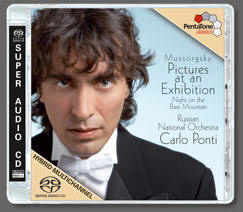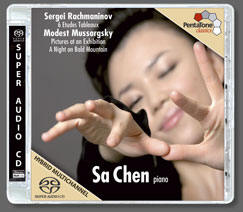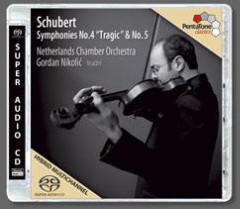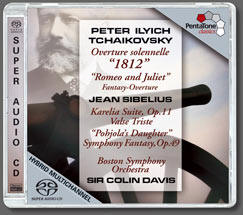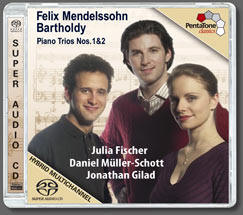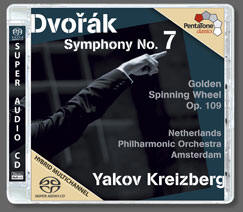|
You are reading the older HTML site
Positive Feedback
ISSUE
A Classical Half
Dozen from PentaTone
Modest Mussorgsky, Pictures at an Exhibition. Night on the Bare Mountain. Orchestra: Russian National. Conductor: Carl Ponti. PentaTone Hybrid SACD PTC 5186 332 Mussorgsky is famous for three compositions: the opera Boris Godunov, the fantasy Night on the Bare Mountain and his collection of solo piano pierces, Pictures at an Exhibition. What is easily forgotten is the interesting fact that none of these is famous or well known in their original form. Other composers have made them famous by their own arrangements. Here in this release we hear Night on the Bare Mountain as arranged by Rimsky-Korsakov and perhaps the most famous arrangement ever of any musical composition, that by Maurice Ravel of Pictures at an Exhibition. There are three additional excerpts not listed above and not listed on the cover of the liner notes. All three were also orchestratred by other composers. They are from the operas The Sorochinsky Fair and Khovanshchina. It is not really fair to fault Mussorgsky, as example both compositions listed above stand alone quite excellently as composed for solo piano as will be shown on the following review below. Here the performances with Carol Ponti conducting are quite good, very solid bringing out the inherent beauty of the melodic passages and the lyrical or descriptive passages that attempt to describe the various pictures musically. The painter was a close friend of Mussorgsky. The audio quality is quite excellent and typical of most of PentaTone's recent efforts. Absolutely full range and very low in and audible distortions, no effort was made to "hype" the sound quality by boosting the bass drum thwacks or having the cymbals jumping out of their usual place near the rear. Even though it may be a studio recording, the reproduction put me near the middle of a typical orchestral hall. Everything is simply musical and the three excerpts (from Khovanshchina and The Sorochinsky Fair ) are a frosting on this musical cake. Every orchestral section is clearly, performing quite excellently with no excessive highlighting. I will get to hear them perform these selections in West Palm Beach and Boca Raton in March if there are no schedule changes. In the meantime a solid recommendation is easily given here.
Modest Mussorgsky, Pictures at an Exhibition. A Night on Bald Mountain. Sergei Rachmaninov. 6 Etudes Tableaux. Sa Chen, piano. PentaTone Hybrid SACD PTC 5186 355 I covered the background in the preceding review (above) with the same two major compositions. The preceding were for full orchestra as orchestrated by other composers. Here are the Pictures at an Exhibition as written by Mussorgsky and the Night on Bald Mountain ,yes it is called Bare Mountain in the preceding recording above, it is Rimsky-Korsahov's version as above, but transcribed by Chernov for piano. We could call that the long way around to get a version of the original for solo piano! If the name Sa Chen is not yet familiar to you, her name will become familiar to you in the near future, believe me. There are three major international piano competitions ranked above all others: Leeds, Chopin and Van Cliburn. So far in piano history, only one pianist has won awards (typically for placing in the top four or five) in all three of those competitions. Yes, that pianist is Sa Chen. Her performance is simply outstanding. I can not imagine a significantly better, more appropriate or powerful performance than that vividly presented here. At the same time she beautifully gives full measure to the lyrical passages. To top it all off, PentaTone's recording team gives us a nearly perfect audio presentation and performance. It does not matter where it was recorded, the SACD layer places listeners about a third of the way back from the piano in a relatively small orchestral hall with excellent acoustics. Somehow this recording is a tad better in nearly every way compared to the fine above reviewed orchestral recording of the same two major compositions. It is very worth while to own and compare the two recordings. Do not expect to hear a better overall piano listening experience of these two selections anytime in the near future. Obviously my highest recommendation must be awarded.
Franz Schubert, Symphonies No.4 "Tragic" and No.5. Netherlands Chamber Orchestra. Gordon Nikolic, leader. PentaTone SACD Hybrid PTC 5186 340 Schubert and Beethoven were contemporaries. Basically the early Schubert symphonies overlapped the later Beethoven ones. Beethoven was twenty seven years older than Schubert and Schubert did not follow in Beethoven's footsteps. Musically he followed Haydn and Mozart and is often considered a bit of a "light weight composer" while excelling in what he usually did. He was very popular and finished seven symphonies. I meant that because perhaps his most popular symphony, No. 8, was never finished and is famous and loved as "the unfinished symphony" with a definitely romantic overall mood. His powerful masterpiece, comparable to Beethoven, "the great C-major symphony," was not performed until after his death. It is a favorite of mine though not typical of Schubert. The two symphonies on this typically excellent PentaTone release are very different from each other. Number four "Tragic" is only tragic in the sense of an instrumental drama. Musicologists find much innovation in the relatively easy going fifth symphony. It is a very pleasing melodic composition simply meant to be interestingly entertaining. It fulfills that role nearly perfectly. As with almost all of the recent PentaTone SACD releases, the audio quality can not be faulted. Here it gives many hints of a moderately sized music hall hosting a rather small orchestra with nothing to interfere with listeners' musical enjoyment. There were no hints of distortions or harshness and the strings were realistic and pleasing . Highly recommended comes as no surprise as excellent audio quality SACD releases become more common the past year or two.
Peter Ilyich Tchaikovsky, Ouverture solennelle "1812". Romeo and Juliet, Fantasy-Overture. Jean Sibelius. Pahjola's Daughter Symphonic Fantasy. Valse triste. Karelia Suite. Boston Symphony Orchestra and Chorus. Colin Davis, conductor. PentaTone Hybrid SACD PTC 5186 164 Many years ago, even before this recording was captured by microphones, it seemed that Tchaikovsky's famous or deemed infamous by some music lovers, 1812 Overture was "The" music selection used by audiophiles to demonstrate the quality of their sound systems. The Mercury recording label used real canons for the scored cannon shots, another company used a huge metal "thunder sheet" and a muscle-man or two hit it with humongous mallet for a cannon shot substitute, reverberation time was said to be less than ten minutes (just kidding about the time). Then Telarc borrowed someone's gigantic bass drum and recorded it close up and the early released recordings of that were unplayable by any phono pickup cartridge of that time. Most tonearms simply jumped off the vinyl record. Ah, yes, those were the audiophile days in the fifties and sixties with 18 inch, 24 inch and even 30 inch woofers in closet size cabinets or three inch thick concrete walled custom cabinets. Returning to my true love, music, and importing a fair amount of vinyl, I ran across an English Decca recording that seemed to me to be the all around best for performance and audio quality. When released later in the U.S.A., it was called a London recording because there was a U.S.A. separate Decca label. It was released time and again under different labels, all with excellent quality, for a couple of decades. I referred to it more than once and always had a few readers contact me, agreeing about how great the recording (particularly the performance, conducting) was. No one seemed to know; was there ever another recording released with that outstanding conductor! Of course it was eventually released as a FFSS London CD, #CSCD 6038, Kenneth Alwyn conducting the London Symphony Orchestra, playing Tchaikovsky's three famous showpieces, the 1812 Overture, March Slave and my personal favorite, Capriccio Italian. It had been a very long time since I had listened to it and I pulled it out and listened. My memory served me well and I was rewarded with a performance by conductor and orchestra that served the musical beauty and overt drama equally well, both superbly. The "supposed cannon blasts" were noting to brag about, but that sound on this some years later recording being reviewed here, is a real embarrassing disaster. Truly, if asked after hearing the first "cannon blast" I would have said the microphone had been dropped again and again and again. Not just because of the worse "cannon blasts") I've ever heard (why not just thwack the bass drum with a microphone nearby), other than the beautifully performed choral section, optionally performed here, overall I am disappointed with this 1812 Overture performance and its audio quality. I now need to insert the fact this SACD disc was recorded just over thirty years ago at the Boston Symphony Hall! Philips Classics did many recordings thirty or more years ago with intentions of releasing them in a four channel format, for vinyl records, quadraphonic, so called. They were not released at that time. I listened to one or two perhaps two years ago and was not particularly impressed. What I heard then probably preceded what I am now reporting (I do not remember seeing a RQR icon). PentaTone is now releasing the best f those four channel recordings ( no center or separate bass/woofer outputs) in a special remastered series. It is called RQR (Remastered Quadro Recordings). There is a RQR on the back of this and other releases' packaging to identify them. Let me not say any more about the 1812 Overture here. All the other selections offer excellent audio quality –no exceptions and note worthy deep palpable bass response as well as outstanding reproduction of the brass. The stereo layer, the layer I usually report on, is outstanding overall. You will need to decide on the multichannel in your system since there is no center channel recorded; will your right plus left channels fill in properly for you? The Karelia Suite, a long time personal favorite, is a beautiful melodic gem and the Romeo and Juliet Fantasy-Overture is performed and recorded as well as any version in my memory. Experiment when listening, comparing multichannel with the stereo layer. With one exception, very highly recommended, particularly to classical newcomers, welcome aboard.
Felix Mendelssohn Bartholdy, Piano Trio No.1. Piano Trio No.2. Julia Fischer, violin. Jonathan Gilad, piano. Daniel Muller-Schott, cello. PentaTone Hybrid SACD PTC 5186 085 For those listeners new to classical music here's a minimal size group, three, to take what at times sounds like music for a piano and adds the richness of the cello and the counter balance of the violin for completeness. The background in the first trio is love (mainly) and death. Overall the second trio winds up being a bit more serious or at least more reflective. Not always used, now and in the past, the name Bartholdy was added when Felix's father converted to Christianity. Think of both these excellent and beautiful piano trios as miniature symphonies. Expect the same differences between the four movements in each one. Think of an encompassing introduction, a finishing or finale, a quiet lyrical change of pace and so on. Do not expect to find a superior or even equal performance any time soon. The audio quality is simply "the real thing" and not to be bettered though I wish the cello could be more prominent though the composer is partly to blame for that. The pianist and violinist are, as usual, the ones that get to show off. Highly recommended and if you want to try some orchestral Mendelssohn, I would suggest his violin concerto (one of the three or four most beautiful ever written) and one of later symphonies such as the Italian, his fourth.
Antonin Dvorak, Symphony No. 7. Zlaty kolovrat (The Golden Spinning Wheel). Netherlands Philharmonic Orchestra Amsterdam. Yakov Kreizberg, conductor. PentaTone Hybrid SACD PTC 5186 082 Though usually well regarded, this Dvorak symphony is not one of his most popular. Much of Dvorak's musical output is out-going with long lyrical passages and immediately recognized melodies. Here things, in general tend to be more serious and with some almost profound statements to be made at times. Do not get me wrong, there is beauty and melody to be heard here but not as much as in his symphony No. 9 (The New World) or No. 8. The performance including the conducting is not to be faulted. However, there is a definite hint of brightness in some of the louder passages though still very good overall. The rather lengthy Golden Spinning Wheel recorded in the same location about a year and a half later does not exhibit that hint, not a bit, while revealing a more three dimensional soundscape. At the same time, both its beginning and final couple of minutes reveal some of the deepest, most powerful drum thwacks I've heard in long time (audiophiles take note) though that composition and story behind it are a bit unusual and I would never attempt to pronounce its name in the native language.
|

